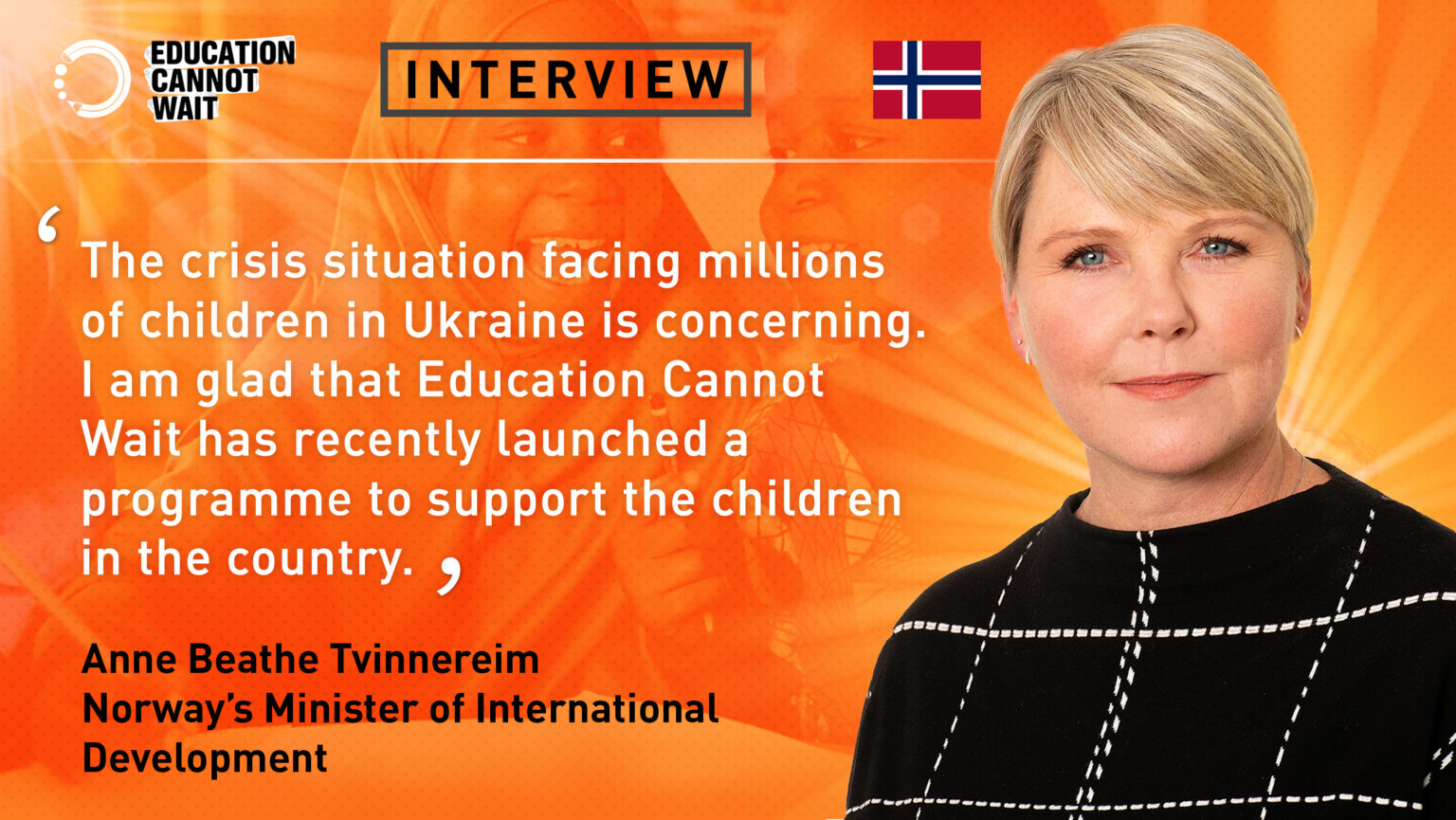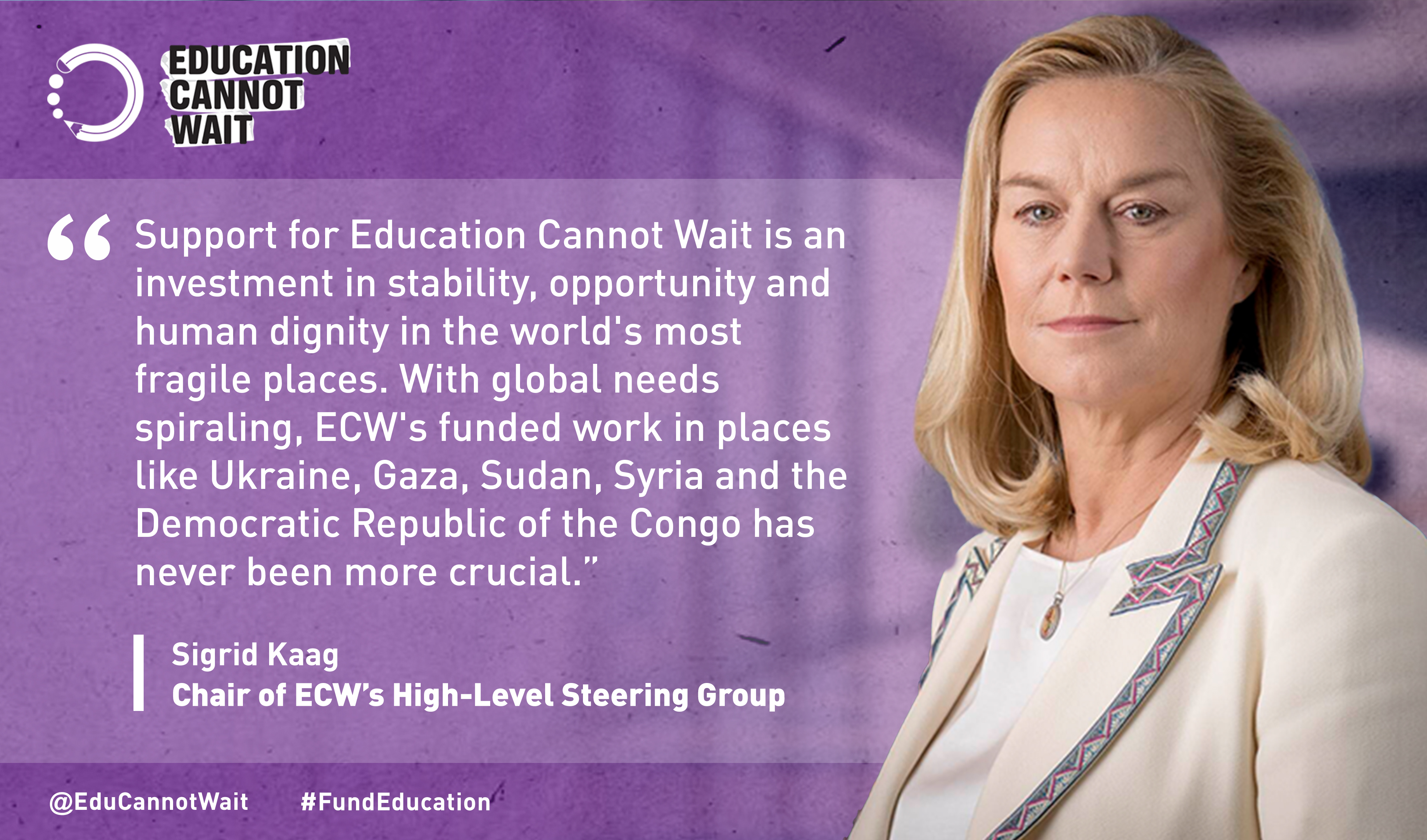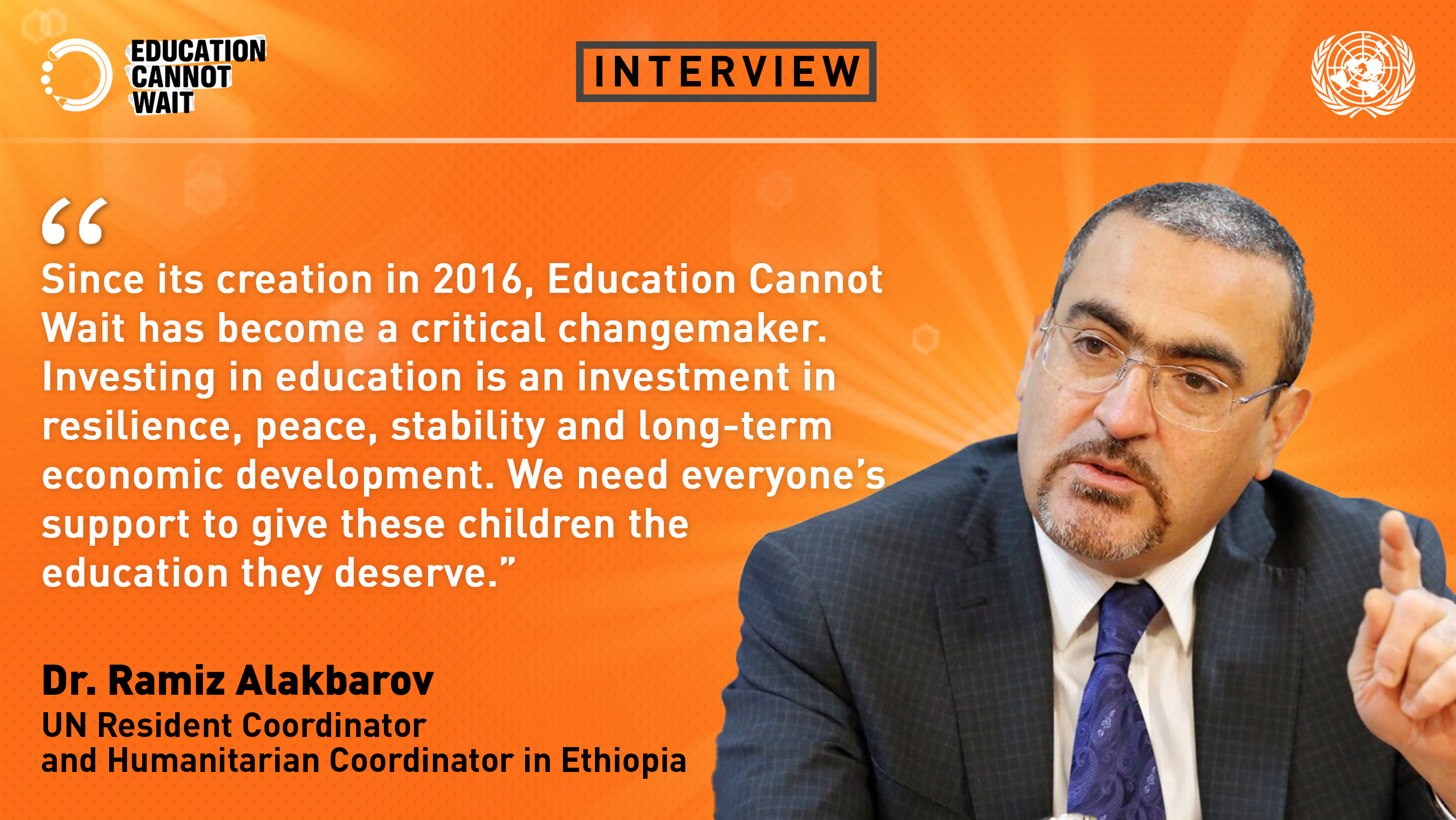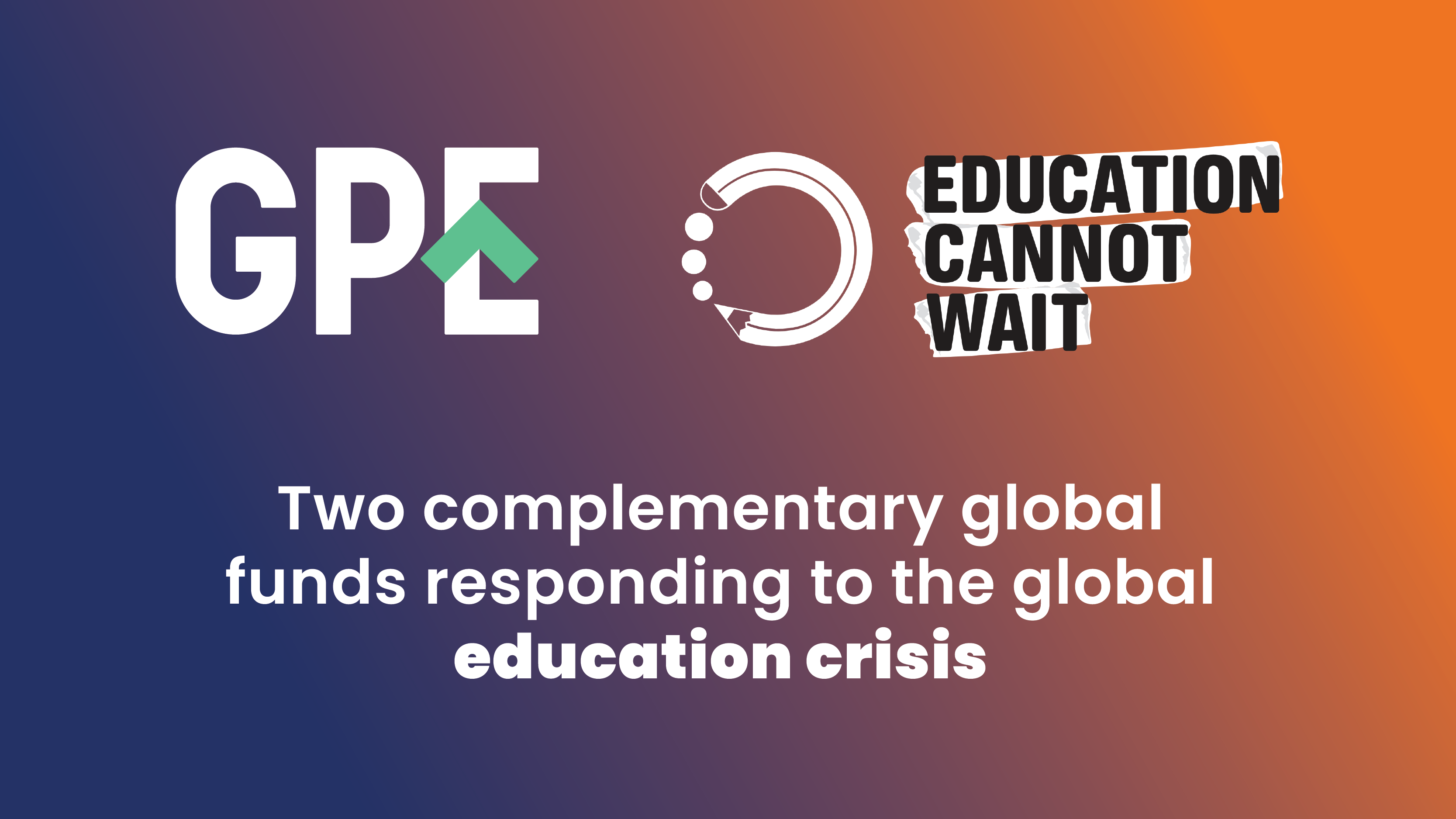ECW Interviews Norway’s Minister of International Development Anne Beathe Tvinnereim

ECW: The International Disability Alliance (IDA), Government of Norway and Government of Ghana hosted the second Global Disability Summit in February. At the summit you called on partners to commit to ensuring children with disabilities can access their inherent human rights, including the right to education. How can we transform the delivery of education in emergencies to ensure no child is left behind?
Minister Anne Beathe Tvinnereim: UN Member States have committed to leave no one behind in their implementation of the Sustainable Development Goals. Ensuring no one is left behind also means inclusion of persons with disabilities. We have to make sure that children with disabilities are given access to quality education and assure their safe and meaningful participation. As a minimum this requires 1) disability-disaggregated data, 2) combatting stigma and discrimination, and 3) meaningful engagement of persons with disabilities in decision-making processes. For education in crisis and emergencies, it is vital to strengthen the capacity of teachers, ensure universal design of learning environments and materials, and provide linkages between education services and other support services such as health and protection, as well as to assure that education provides a safe space. The success of this work depends on close collaboration between states, multilateral organisations, civil society organisations, organisations of persons with disabilities, and a wide range of partners.
ECW: Norway is a leading donor and key strategic partner of Education Cannot Wait. Why is investing in education in emergencies and protracted crises important for our world? And why is it important for the people of Norway? What message do you have for other potential donors, including the private sector, who are considering investing in education through ECW?
Minister Anne Beathe Tvinnereim: Education is essential to live healthy and productive lives. We need to assure that all children get a quality education, also children affected by crisis and conflict situations. Assuring the right to a quality education is a basic principle for the welfare system in Norway, and we would like to contribute to assuring this fundamental human right elsewhere. We are not going to achieve SDG4 if we do not assure that children affected by climate crisis can continue their education. I am concerned about the crisis situation facing millions of children in Ukraine, and I am glad that ECW has recently launched a programme to support the children in the country.
Norway is glad to be a co-convener of Education Cannot Wait’s replenishment conference. I urge all donors and private sector to rally around, and contribute to, the replenishment conference.
ECW: COVID-19, brutal conflicts and other emergencies are pushing children’s mental health and well-being to the limits, as they live through the unspeakable trauma of war, displacement, gender-based violence and other grave violations. How can psychosocial support and mental health services be applied to protect children and accelerate our work to achieve the Sustainable Development Goals?
Minister Anne Beathe Tvinnereim: In emergency situations, education is definitely an important factor in the mental and physical protection of children and youth. Education can offer learners protection through a safe, stable environment in the midst of crisis, and help restore a sense of normality, dignity, and hope by providing routine and structured activities that help build children’s social and emotional skills. To assure education is included in humanitarian response, and to assure schools are protected from attack, has been a priority for Norway for many years. This is why the Safe Schools Declaration is so important. We encourage all states to endorse and implement the Safe Schools Declaration. 114 countries have endorsed the declaration so far. Norway also calls for the implementation of Security Council Resolution 2601 (2021).
Ensuring that mental health services and psychosocial support are included in primary health care is important, especially during and after humanitarian crisis. Mental health is one of the most neglected areas of health. Teachers must be given training on how to best support their students and that students are provided with psychosocial support and mental health services. In addition, it is important to remember that teachers might themselves be affected by the emergency and be traumatized and might therefore also need to receive adequate support to manage the situation.
ECW: You previously served as Norway’s State Secretary in the Ministry of Local Government and Regional Development. How can the Grand Bargain Agreement’s Localization Agenda help improve the delivery of education in the world’s worst humanitarian crises?
Minister Anne Beathe Tvinnereim: Our government has as one of its priorities to improve coherence between humanitarian and development efforts and to contribute to sustainable solutions. In this regard, strengthening local and national capacity to respond to humanitarian and protracted crises is important and should be given priority. In order to protect education in emergency situations it is an important principle that schools should not be used for military purposes. It is important that people affected by a crisis should be able to participate in and influence decisions. With regards to the education sector this should include involving and listening to the perspectives of students, parents as well as teachers and other education staff. The role of national organizations must be acknowledged. Such organizations can, for instance, play an important role in advocating for the right to education and making sure that the voices of affected populations are heard. They know the situation on the ground best, and it is crucial to involve them I all processes.
ECW: An estimated 64 million crisis-impacted girls are being denied their right to continuous quality, inclusive education. Recent analysis indicates that as many as 20 million girls may never return to school due to COVID-19. Why must we ensure every girl on the planet has access to continued quality education? How can we ensure education continuity from early childhood education through university?
Minister Anne Beathe Tvinnereim: First of all, education is a right – for all children and young people, regardless of their gender. We know that girls and women who have been in school live healthier lives, have higher incomes and can take better care of their children. Women who are educated also play a stronger political and economic role in their own societies. Therefore, ensuring that girls get an education is paramount; it is valuable for each and every girl but also for society. I am appalled by the current situation in Afghanistan where girls, after a certain age, are denied the chance to get a secondary education.
Education systems, from early childhood to university, must be inclusive, and they should provide education that is gender transformative and of good quality. In many countries, girls drop out when they reach adolescence. Girls are not always in charge of their own bodies, and they must learn about gender equality, rights and reproduction to be able to uphold their rights. That is why comprehensive sexuality education is a priority in Norway’s development policy. It is also important that policies and practices that are pushing girls out of school are removed, for instance when girls are prevented from attending school when they get pregnant or after giving birth.
ECW: Around the world, we are seeing how the climate crisis is triggering conflict, displacement and disrupting progress toward the Sustainable Development Goals. How can we better connect climate, education and sustainable development in most-affected regions, like the Sahel, where its impact is particularly strong?
Minister Anne Beathe Tvinnereim: We are only beginning to fathom the impact of climate change. Extreme weather is increasing in severity and occurrence. Climate change and environmental degradation impact access and quality of education in numerous ways. Through increased migration, through poverty and though malnutrition; as well as through the direct impact on school infrastructure and supplies. In many contexts, girls and women are disproportionally affected by crisis and displacement. We must have a special focus on protection of girls and on girls’ education when addressing the impact of climate crisis.
Climate change not only affects education delivery. The relationship is also the other way around as education is of essence to climate change prevention and emergency preparedness. Quality education enables children and their families to make informed choices and to become part of the climate change solution. It is positive that Education Cannot Wait has, for instance, provided support to countries such as South Sudan, Somalia and Haiti, which have all been affected by natural disasters. We must also focus on the Sahel countries, where the impact of climate change is particularly strong. I believe education and climate change needs to be put higher up on the international agenda.
ECW: Our readers would like to know you a little better on a personal level and reading is a key component of education. Could you please share with us two or three books that have influenced you the most personally and/or professionally, and why you’d recommend them to other people to read?
Minister Anne Beathe Tvinnereim: I love reading. One of my favorite books is Growth of the Soil (Norwegian Markens Grøde). To me it’s a love song to nature and I truly love spending time outdoors when off work. The author, Knut Hamsun, won the Nobel Prize in Literature in 1920. Another favorite is Ben Okri. I love everything he writes. If I was to highlight some of his writing I would choose the poem titled “A New Dream Of Politics.” Not only because it challenges us as politicians but also because it is a salute to idealism.
About Minister Anne Beathe Tvinnereim
Anne Beathe Tvinnereim is Norway’s Minister of International Development. The Minister of International Development is responsible for international development efforts in countries outside the OSCE, the Middle East, North Africa and Afghanistan. She is also responsible for development cooperation under the auspices of the UN system, the World Bank, the regional development banks and other global funds and programmes. In addition, she is Minister for Nordic Co-operation and responsible for Norad, Norec and Norfund. Learn More



